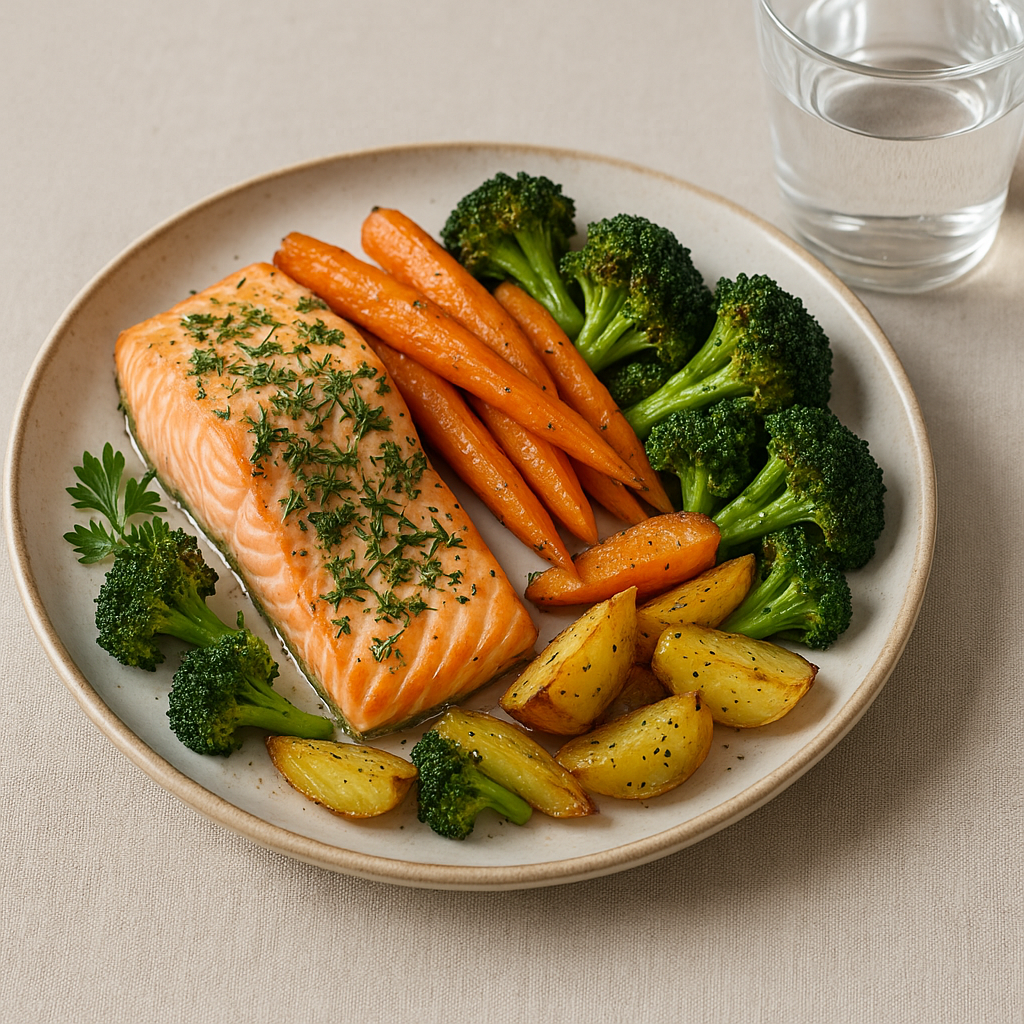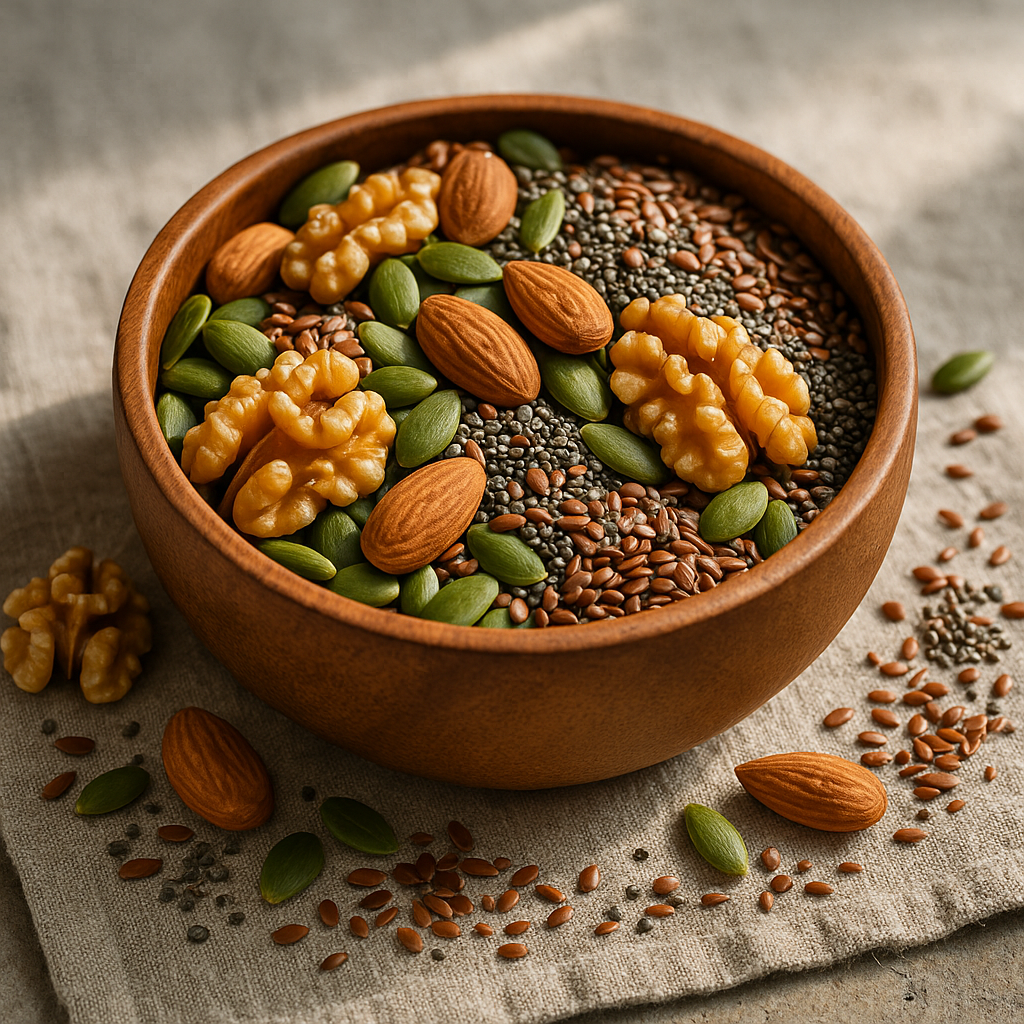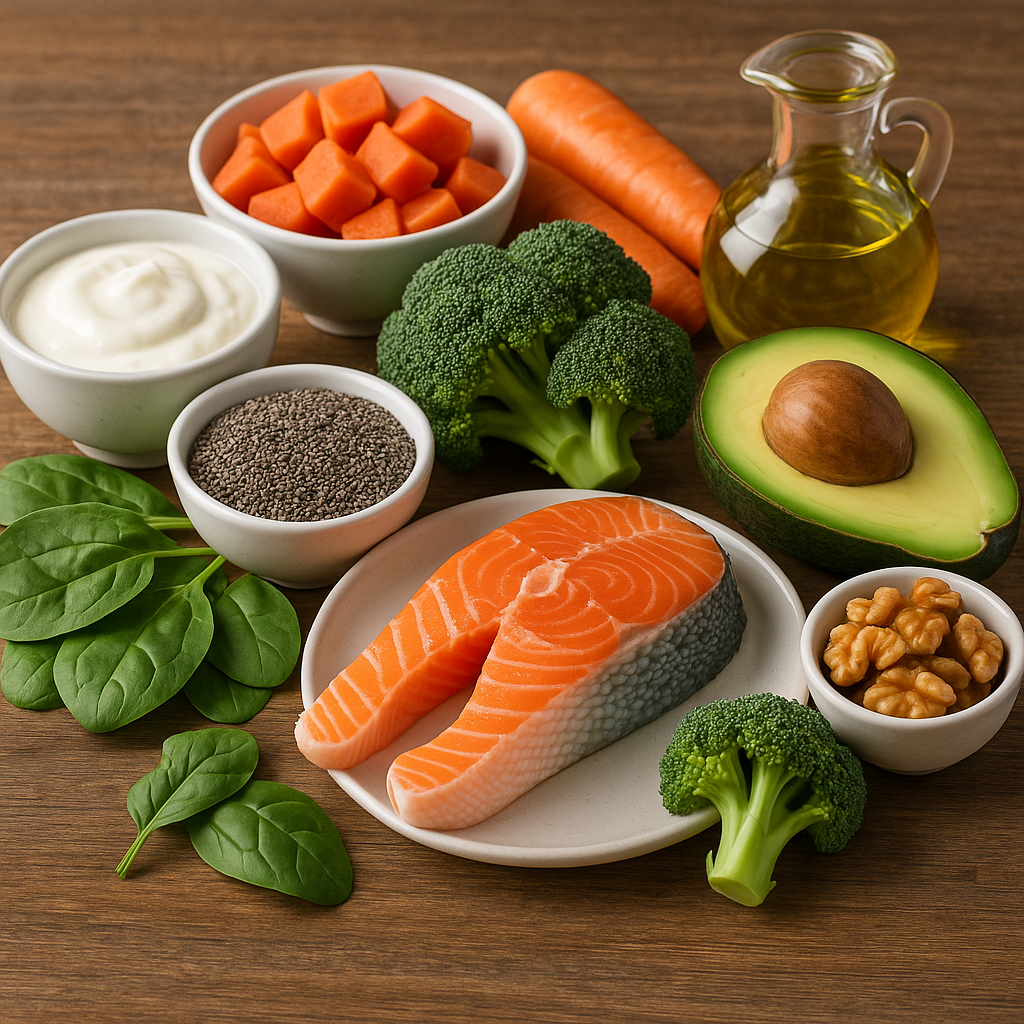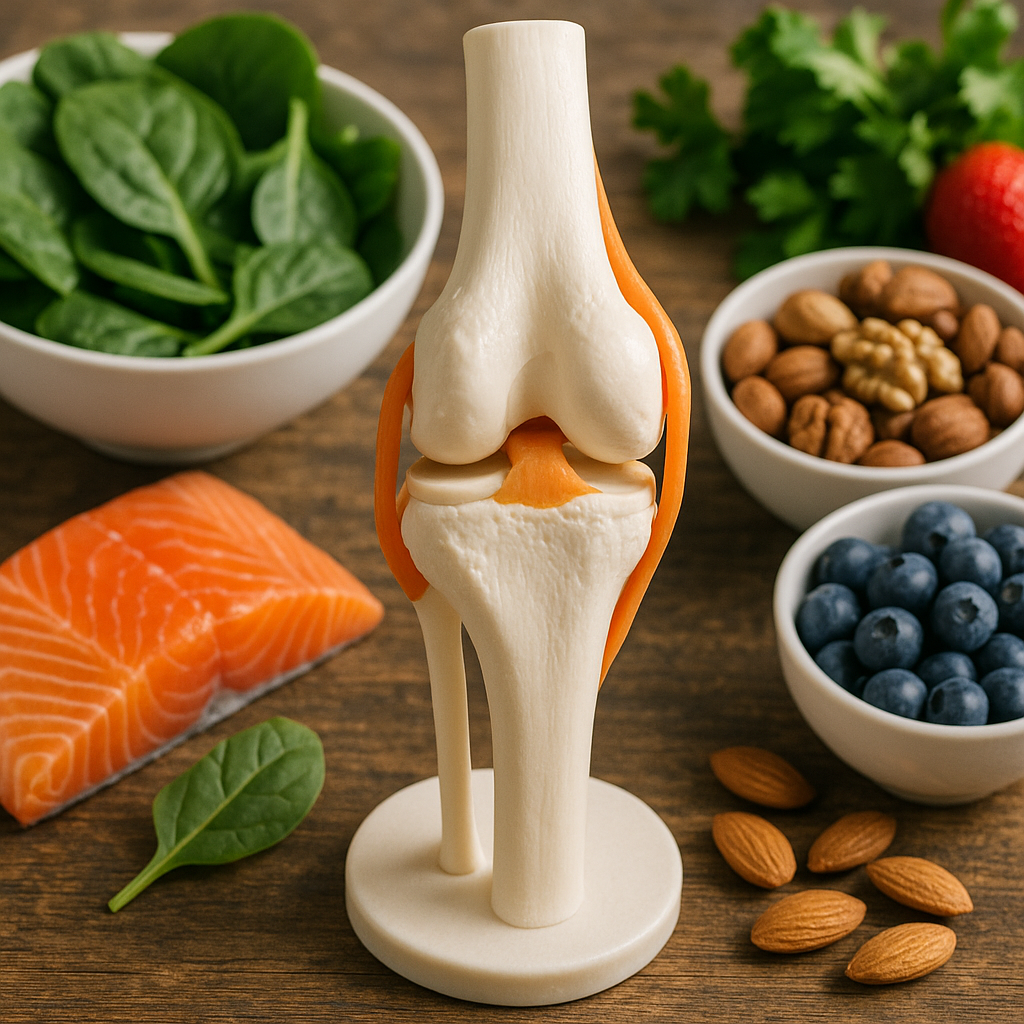Joint health is one of the most important aspects of human well-being, which we often pay too little attention to until the first signs of pain or discomfort appear. Our freedom of movement, daily activities and quality of life directly depend on the condition of our joints.
While genetics and age play a role in joint health, our dietary habits also play a crucial role in maintaining joint structure and function. Research shows that certain foods and the key nutrients they contain can significantly reduce inflammation, support cartilage repair, and strengthen connective tissue.
In this article, we’ll discuss why nutrition is so important for joint health, introduce the five most effective foods for maintaining healthy joints, and advise you on which foods to avoid. Whether you’re already experiencing joint discomfort or want to prevent future problems, this knowledge will help you make better dietary decisions.
Why Nutrition Matters for Joint Health
Joints are complex structures made up of cartilage, ligaments, tendons, and synovial fluid. All of these parts require specific nutrients to form, repair, and function properly. Modern scientific research reveals increasing evidence that a deficiency or excess of certain nutrients can directly affect inflammatory processes in the body and contribute to degenerative joint changes.
One of the most important factors affecting the condition of the joints is chronic inflammation. When persistent inflammatory processes occur in the body, they gradually destroy the structure of the joints, promote pain and disrupt natural tissue regeneration. Certain foods have anti-inflammatory properties that help reduce these processes.
Key nutrients important for joint health:
- collagen – the main protein of connective tissue;
- omega-3 fatty acids – natural compounds that reduce inflammation;
- antioxidants – protect cells from oxidative damage;
- calcium, magnesium and vitamin D – essential for bone strength;
- vitamin C – promotes collagen production;
- glucosamine and chondroitin – help maintain the elasticity of cartilage.
According to rheumatologists, a balanced diet rich in these substances can not only help alleviate existing joint ailments, but also act as a preventive measure, especially for those who are at higher risk of joint diseases due to genetic factors or lifestyle.
The 5 most beneficial foods for joints
Based on scientific research and traditional experience, we have identified five foods that are particularly beneficial for joint health due to the active components they contain. These products not only help fight inflammation and pain, but also provide the body with substances necessary for the regeneration of joint structures.
Oily fish (salmon, mackerel, sardines)
Oily fish is one of the best sources of omega-3 fatty acids, especially EPA (eicosapentaenoic acid) and DHA (docosahexaenoic acid). These fatty acids have a strong anti-inflammatory effect. Studies show that people who regularly eat oily fish suffer from rheumatoid arthritis symptoms less often, and those who already have them experience less pain and joint stiffness.
Omega-3 fatty acids work in several ways:
- inhibit inflammatory proteins that cause joint tissue damage;
- reduce inflammatory markers in synovial fluid;
- improve blood circulation, which helps deliver nutrients to the joints;
- help maintain joint flexibility and cartilage integrity.
It is recommended to eat at least 2-3 servings of fatty fish per week.

You can bake it in the oven with herbs, stew it with vegetables, or marinate it in lemon juice and eat it cold. If you don’t like fish or don’t have the opportunity to eat it often, high-quality omega-3 supplements can be a great alternative.
Bone broth
Traditional bone broth, or “grandma’s medicine,” has remained popular for centuries for good reason. It is a source of natural collagen, gelatin, and glucosamine—substances that are directly involved in the formation and regeneration of joint cartilage.
The long cooking process releases valuable substances from bones, joints, and connective tissues:
- Type I and II collagen—the main building protein of joint cartilage and connective tissue;
- glycine and proline—amino acids that help reduce inflammation and strengthen cartilage;
- chondroitin—a substance that helps cartilage maintain elasticity and moisture;
- minerals such as calcium, magnesium, and phosphorus.
Homemade bone broth is a simple yet effective way to support joint health.

It’s easy to make: just simmer beef, chicken, or fish bones with vegetables and herbs for 8 to 24 hours (depending on the type of bones you use). You can drink the broth as a tea, use it to make soups and sauces, or cook grains in it.
Leafy greens and cruciferous vegetables
Broccoli, kale, cauliflower, spinach, and other dark green and cruciferous vegetables are rich in antioxidants, vitamins, and minerals that help fight inflammation and protect joints from oxidative stress.
These vegetables contain valuable nutrients:
- sulforaphane, a powerful antioxidant found in particularly high amounts in broccoli;
- vitamin C, essential for collagen synthesis;
- vitamin K, important for bone metabolism;
- calcium, a key element in bone structure;
- folate, which helps reduce inflammation.
Dark green leafy vegetables also provide not only antioxidants but also essential minerals – learn more about vital nutrients like zinc, which helps maintain normal bone and joint function.
It is recommended to eat these vegetables daily, ideally fresh or minimally cooked (steamed or lightly fried). This preserves the most nutrients that are good for joints.
Berries (blueberries, cherries, blackcurrants)
Berries are real antioxidant bombs, rich in anthocyanins and other polyphenols, which have strong anti-inflammatory effects. These substances help neutralize free radicals that can damage joint tissue and accelerate its degeneration.
Different berries have different benefits:
- Cherries, and especially tart cherries, are rich in anthocyanins, which inhibit the same inflammatory pathways that some painkillers affect;
- blueberries have a high antioxidant activity and help protect joint cells from oxidative damage;
- black currants have both antioxidant and anti-inflammatory effects due to their high vitamin C content and specific anthocyanins;
- raspberries contain ellagic acid, which also has anti-inflammatory properties.
Berries are easy to include in your daily diet – they can be eaten fresh, frozen, added to smoothies, porridges, yoghurt or even used as a natural salad topping. It is recommended to eat at least a handful of different berries every day.
Nuts and seeds
Nuts and seeds are concentrated stores of nutrients, especially beneficial for joint health. They are rich in plant-based omega-3 fatty acids, vitamin E and minerals, which support joint function and reduce inflammation.
The most valuable nuts and seeds for joints:
- walnuts – one of the richest plant-based sources of omega-3;
- chia seeds – have more omega-3 than salmon (by weight);
- flax seeds – a great source of alpha-linolenic acid (ALA);
- pumpkin seeds – rich in zinc, which is important for collagen formation;
- almonds – rich in vitamin E, which protects cells from oxidative stress.
Nuts and seeds are easy to incorporate into your diet – you can sprinkle them on salads, porridge, yoghurt, mix them into homemade energy bars or simply snack on them between main meals.

It is recommended to eat about 30 g (a handful) of various nuts and seeds per day.
For those seeking comprehensive joint care, it is worth looking into collagen supplements, such as KIKI Health Type 1, Type 3 Collagen Peptides for Joint Health, which complement natural nutrition and help ensure sufficient collagen levels in the body.
Foods to avoid for joint health
While some foods can help maintain joint health, others can promote inflammation and worsen joint condition. Research and clinical experience show that limiting the consumption of these foods can reduce joint pain and slow down degenerative processes.
- Processed foods and added sugars – increase inflammatory processes in the body, worsen insulin sensitivity and promote obesity, which further burdens the joints. Studies show that reducing sugar consumption can significantly reduce joint pain and inflammatory markers in the blood.
- Trans fats – found in fast food, baked goods with margarine, and snacks promote inflammation and oxidative stress. They damage cell membranes and prevent the body from fighting inflammation.
- Processed red meat – high levels are associated with increased levels of inflammatory cytokines, which contribute to joint pain. Processed meat products with preservatives and high salt content are especially harmful.
- Alcohol and caffeinated drinks – consumed in large quantities promote dehydration, which negatively affects synovial fluid – the natural “lubricant” of the joints.
- Nightshades – tomatoes, potatoes, eggplants, and peppers can trigger joint pain in some people, especially those with autoimmune diseases. These foods contain alkaloids that can cause sensitivity and increase inflammation.
It is important to understand that each person’s body reacts individually. What causes pain for one person may not be completely harmless for another. Therefore, it is useful to keep a food diary and track which foods cause or aggravate joint ailments. It is also a good idea to consult with a doctor or nutritionist for an individualized nutritional strategy.
Summary
Joint health is a long-term project that requires consistent attention and conscious choices. Regular consumption of the foods discussed above can significantly contribute to smooth joint function, reduce inflammation, and facilitate movement.
Fatty fish, bone broth, green leafy and cruciferous vegetables, various berries, and nuts and seeds are natural joint health boosters that are easy to include in your daily diet. It is important not only to know what to eat, but also what to avoid – processed foods, added sugar, trans fats, and other inflammatory products.
Remember that nutrition is only one of the factors determining joint health. To achieve optimal results, it is also important to maintain a normal body weight, exercise regularly (especially swimming, yoga, walking), and avoid smoking and excessive alcohol consumption.
If you experience persistent or worsening joint pain, consult a doctor who will be able to offer an individualized treatment plan that includes both dietary adjustments and other measures. A conscious diet and essential vitamins for joints, along with other healthy lifestyle practices, can help you maintain an active and quality life for many years.
Frequently Asked Questions
What foods are the richest sources of natural collagen?
Bone broth, chicken with skin, and certain seafood, such as fish skin, have the highest concentrations of natural collagen. Hydrolyzed collagen supplements are a convenient option for daily consumption, as they are more easily absorbed by the body.
How often should I eat anti-inflammatory fish to strengthen my joints?
To achieve a significant anti-inflammatory effect on my joints, it is recommended to eat at least 2 servings of oily fish per week. Fresh salmon, mackerel, or sardines will provide the most benefits.
Are nightshades really bad for joint health?
For most people, tomatoes, potatoes, and peppers are harmless, but a small percentage of people, especially those with certain autoimmune diseases, may notice increased joint discomfort. It is advisable to keep a food diary to determine your individual sensitivity.
What other lifestyle factors help keep your joints healthy?
In addition to a healthy diet, the following factors are particularly important for joint health: maintaining a normal body weight, regular low-intensity physical activity (swimming, walking), not smoking and moderate alcohol consumption, as well as good posture and an ergonomic work environment.
Can supplements completely replace a joint-friendly diet?
While supplements (collagen, omega-3, zinc) provide a convenient way to supplement your diet, they work best in conjunction with – not in place of – a complete diet rich in joint-supporting foods. A balanced diet provides a wide range of nutrients that work together to provide optimal joint health.


